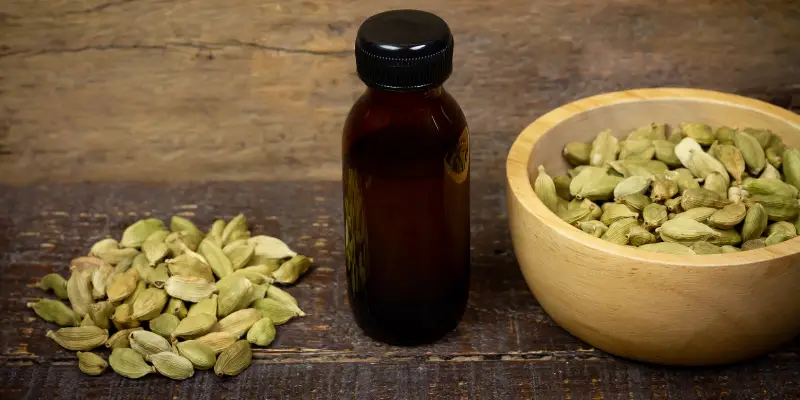Table of Contents
Regarding the health and nutrition of our beloved pets, dog owners constantly seek the best options available. We always try to find foods for our pets that are not bad for their health. Cardamom emerges as a topic of interest among the myriad spices and herbs that benefit human health.
For pet owners, this pungent spice, known for its culinary adaptability and beneficial properties, poses an interesting question: Can Dogs Eat Cardamom? With its distinct sweet and spicy flavor, cardamom is a staple in many kitchens around the globe, but does it hold the same value for canine consumption?

When we think about whether dogs can eat cardamom, we also start to wonder about other safe and good spices and herbs for dogs. Their meals have to be enjoyable in addition to being healthier. We must use more care when deciding whether cardamom is safe for dogs. We must learn about what’s in cardamom, how it might affect dogs, and how to give it to them. Therefore, we must listen to the advice of professionals and veterinarians. This helps us ask the main question: Can dogs have cardamom?
What Is Cardamom?
Cardamom is a type of spice that comes from the seeds of a plant family. Ginger also belongs to the same plant family. Because it tastes sweet and spicy, people prefer to use it in baking and cooking. The spice looks like small green pods but can also be used as a ground powder.
It prepares food worldwide, particularly Middle Eastern and Indian cuisines. It aids digestion and adds flavor to our meals, among other health advantages. You can add cardamom to sweet dishes like cakes or use it to flavor tea. It’s a trendy spice because of its unique taste and smell.

Is Cardamom Good For Dogs?
Can Dogs Eat Cardamom? Cardamom can be healthy for dogs when used in very small amounts. It helps in digestion and helps dogs breathe more deeply. Antioxidants found in cardamom can help a dog’s immune system. On the other hand, overuse may upset a dog’s stomach, so use caution when using it.
Consult a veterinarian first, and always gradually add things to your dog’s diet to observe how they respond. This ensures the food is safe for specific dogs, particularly those with medical conditions. So, while cardamom can be healthy, it’s essential to use it wisely and sparingly in a dog’s diet.
Benefits of Feeding Cardamom to Your Dog
While the direct research on dogs and cardamom is limited, certain benefits can be extrapolated from its known effects on humans and general canine health principles. For instance, cardamom’s anti-inflammatory properties could potentially aid dogs with arthritis or other inflammatory conditions.
Can Dogs Eat Cardamom? Yes, and here’s why it might be a good idea:
- Digestive Aid: Cardamom is known for its ability to soothe upset stomachs and reduce bloating in humans. It may offer similar benefits for dogs suffering from mild digestive issues.
- Fresh Breath: This spice is a natural breath freshener. Adding a small amount of cardamom to your dog’s diet could help combat bad breath.
- Antioxidant Properties: The antioxidants in cardamom can support your dog’s immune system, helping them fight off illnesses and maintain overall health.

How Can I Give My Dog Cardamom?
Introducing cardamom to your dog’s diet should be done cautiously and in moderation. The key is to start small. Here’s a step-by-step guide to safely incorporating cardamom into your dog’s meals:
- Start with a Tiny Amount: Begin with a pinch of ground cardamom mixed into your dog’s food. Watch for any adverse reactions over the next 24-48 hours.
- Observe Your Dog: Observe your dog’s behavior and feces closely. Take urgent action to stop using if you experience any discomfort or allergic reactions.
- Gradually Increase: If your dog shows no adverse effects, you can gradually increase the amount of cardamom but never exceed 1/8 teaspoon for small dogs or 1/4 teaspoon for larger breeds.
Are There Other Spices I Can Give My Dog?
After addressing the question, Can Dogs Eat Cardamom? You might wonder about other spices. Yes, several other spices and herbs can be beneficial for dogs when used in moderation and under the guidance of a veterinarian. Here’s a list of some commonly used spices and herbs that are generally considered safe for dogs:
Turmeric
Known for its anti-inflammatory properties, turmeric can help with joint pain and inflammation. Its curcumin content has been linked to several health advantages.
Ginger
It is helpful in small amounts for aiding digestion and relieving nausea. Additionally, it might help with gas and bloating.
Parsley
Rich in vitamins and antioxidants, parsley can freshen your dog’s breath and support kidney health. However, avoid spring parsley, which can be toxic to dogs.
Cinnamon
Cinnamon can help regulate blood sugar and improve heart health in small amounts. It also has anti-inflammatory properties. Make sure to use Ceylon cinnamon instead of Cassia Cinnamon, as Cassia can be harmful in large doses.
Peppermint
Well-known for aiding with digestion, peppermint helps ease gastrointestinal distress and minimize indigestion. However, it should be used sparingly and only in its natural form.
Rosemary
Antioxidants included in this plant can help with digestive and heart health. It’s been used as a natural flea deterrent as well.
Basil
Dogs may safely consume basil since it has anti-inflammatory, antiviral, and antioxidant properties.
Oregano
Contains antioxidants and is known to have antimicrobial properties. However, due to its strength, it should only be taken very sparingly.
Thyme
Thyme is safe for dogs and is good for the skin and digestive system because of its antibacterial and antifungal qualities.
Fennel
This can be beneficial for dogs with gas and indigestion. It is renowned for having anti-inflammatory qualities as well.
Help! My Dog Ate Lots of Cardamom!
If your dog has ingested a lot of cardamom, monitoring them closely for any signs of discomfort or allergic reaction is vital. Symptoms to watch for include gastrointestinal upset, diarrhea, or allergic reactions. If any of these occur, contacting your vet immediately is essential.

Nutritional Content of Feeding Cardamom to Your Dog
Cardamom for dogs offers several nutritional benefits. It’s packed with minerals like magnesium and potassium and vitamins like C and B6. These nutrients help strengthen the immune system, enhance digestion, and even help dogs breathe cleaner. But moderation is the watchword.
Should You Feed Cardamom to Your Dog?
Regarding spices, the question, “Can dogs eat cardamom?” is frequently seen in pet owners. Yes, but with some restrictions, that is the short answer. Cardamom is safe for dogs in small quantities and can offer several health benefits, including aiding digestion and freshening breath. But it’s important to add this spice to your dog’s food gradually and carefully.
Firstly, consider the form of cardamom you’re using. Ground cardamom is easier for dogs to digest than whole pods. When starting, sprinkle a tiny amount (no more than 1/8 teaspoon for small dogs and 1/4 teaspoon for larger breeds) over your dog’s regular food.
Also Read: Can Dogs Eat Pomelo? A Comprehensive Guide
Are There Risks of Feeding Your Dog Cardamom?
Cardamom, while generally safe in small quantities, does come with potential risks. In dogs, excessive consumption may result in gastrointestinal problems including upset stomach, diarrhea, and vomiting. Although beneficial in moderate amounts, the high fiber content can cause digestive distress if ingested in large quantities.
Additionally, the essential oils found in aromatic and flavorful cardamom can be too potent for dogs, leading to adverse reactions. The possibility of an allergic response exists, just like with any human food added to a dog’s diet. This reaction might include skin irritation, itching, or more serious symptoms that need to be attended to by a veterinarian.
Cardamom Essential Oil
When discussing cardamom for dogs, it’s crucial to differentiate between the spice itself and cardamom essential oil. Due to its high concentration, since it may be hazardous, cardamom essential oil should not be mixed properly before topically or internally administered to dogs.
Utilizing it as a pet’s medical medicine or food supplement is never appropriate. Suppose you’re considering aromatherapy for your home that your dog will also be exposed to. In that case, it’s best to consult with a veterinarian to ensure the safety of all essential oils used around your pets.

Can Dogs Eat Cardamom Seeds?
The taste and scent of cardamom are mostly found in its seeds, which are the portion of the plant most utilized in cooking. Grounded cardamom seeds may be healthy for dogs in tiny doses and may even improve digestion and breath freshness. However, whole seeds should be avoided to prevent choking hazards and to ensure your dog’s gastrointestinal system more easily digests the spice.

Can Dogs Eat Cardamom Pods?
The seeds of cardamom are enclosed in a hard outer shell within pods. Dogs are not advised to consume the pods, even if they are not hazardous to them. Dogs may have trouble digesting the outer shell, posing a choking hazard. If you wish to use cardamom for your dog, it’s best to stick with a small amount of ground cardamom seeds and avoid whole pods.
Can dogs eat cardamom powder?
Yes, dogs can eat cardamom powder, but it should be given in very small amounts and cautiously. The powdered form of cardamom seeds has antibacterial qualities that help freshen breath and aid digestion. But there are a few crucial things to remember:
Moderation is Key
Only a tiny pinch of cardamom powder should be added to your dog’s diet. Because dogs have different sensitivities to spices than humans, even small amounts of cardamom can cause stomach upset in some dogs.
Introduction
When introducing any new food item, including cardamom powder, start with a minimal amount to see how your dog reacts. Keep an eye out for symptoms in your dog, such as itching, hives, or gastrointestinal distress, that may indicate an allergic response or upset stomach.
Consult a Veterinarian
Before adding cardamom powder or any new spice to your dog’s diet, it’s best to consult with a veterinarian. They can provide guidance based on your dog’s specific medical requirements and nutritional limitations.
Avoid Excessive Use
Excessive consumption of cardamom, even in powder form, can lead to digestive issues such as diarrhea or vomiting. Using cardamom sparingly and only as a minor supplement to a well-balanced diet is crucial.
Not a Necessity
While cardamom can have some benefits, it’s not necessary for your dog’s diet. Dogs can live healthy lives without spices, so if you’re unsure about introducing cardamom, it’s perfectly fine to exclude it.
To summarize, extremely small, controlled amounts of cardamom powder may be safe for dogs. Your dog’s health and nutritional needs should always come first. If you’re thinking about adding anything new to your dog’s diet, get advice from a veterinarian.

Can Dogs Eat Elaichi (Green Cardamom)?
Elaichi, or green cardamom, is often used in sweet and savory dishes for its sweet, spicy flavor. Similar to cardamom seeds, a small amount of ground green cardamom can be safe for dogs in moderation. It’s crucial to ensure that any addition to your dog’s diet is introduced gradually and in tiny quantities to monitor for adverse reactions.
Can Dogs Eat Black Cardamom?
Black cardamom has a significantly different flavor profile from green cardamom, with a smokier, more robust taste. While not toxic, black cardamom’s intense flavor and larger size make it less suitable for dogs. The same precautions should be taken with black cardamom as green cardamom, favoring very small amounts of ground spice and avoiding whole pods or seeds.

Pregnant Dogs
When Considering Can Dogs Eat Cardamom? Special consideration must be given to pregnant dogs. It is crucial for the mother’s health and safety as well as the health and safety of her unborn puppies. The concern with feeding cardamom to pregnant dogs lies in its potential to stimulate the uterus, which could increase the risk of complications during pregnancy, including premature labor or miscarriage. While studies are limited to the direct impact of cardamom on canine pregnancy, the precautionary principle advises against its use in pregnant dogs to avoid any potential risks.

Frequently Asked Questions
Q1: Can dogs have cardamom in any form?
Ans: Dogs can have very small amounts of ground cardamom into their food. Whole cardamom pods or essential oils are not recommended due to the risk of choking or toxicity.
Q2: How much cardamom is safe to give my dog?
Ans: For small dogs, start with a tiny pinch of ground cardamom (less than 1/8 teaspoon) and observe for any adverse reactions. Discuss your dog’s health and dietary needs with your veterinarian for recommendations.
Q3: Is cardamom toxic to dogs?
Ans: Cardamom is not typically toxic to dogs in small amounts. However, large quantities can cause digestive upset, and cardamom essential oil can be toxic.
Conclusion
In conclusion, moderation and caution are essential, even if “Can dogs eat cardamom?” has been a major subject. Cardamom Powder is a possibly safe and helpful addition to your dog’s food because small amounts can provide benefits like better digestion and fresher breath. However, the dangers of eating too much cardamom, especially for pregnant dogs, are hard to ignore. Avoid using cardamom essential oil because of its high concentration and possible toxicity.
Consulting with a veterinarian is crucial before introducing any new food to your dog’s diet, especially something as potent as cardamom. Depending on your dog’s health, nutritional requirements, and current illnesses, they can offer customized suggestions. Remember that each dog is unique, so what suits one may not work for another. By putting their health and safety first, you can make sound choices that improve your pet’s well-being and guarantee they stay happy, healthy members of your family.

